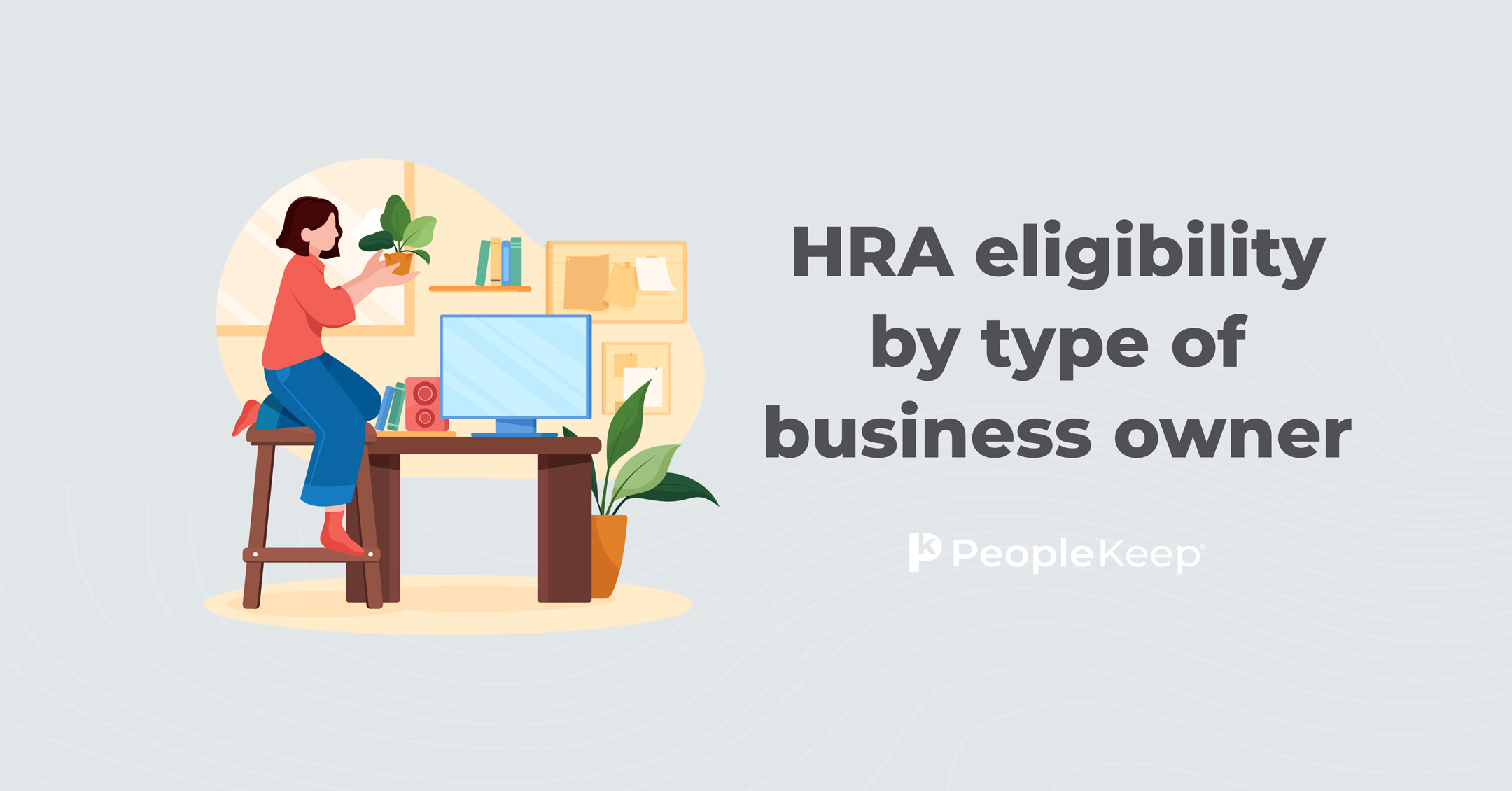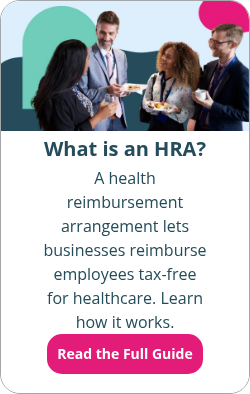HRAs and S corporation owners
By Elizabeth Walker on July 8, 2024 at 11:00 AM
Business owners don’t just want health benefits for their employees. They often wish to secure health insurance coverage for themselves and their families as well. But, depending on your business structure, you may not be able to participate in health benefits, like health reimbursement arrangements (HRAs).
An HRA is a flexible and personalized health benefit. HRAs are attractive for small businesses, like S corporations, because they’re budget-friendly and can support every employee’s needs. However, S corporation owners commonly ask, “Can I also take advantage of an HRA and comply with IRS regulations?”
This article will explain whether S corporation owners can participate in an HRA at their organization.
Takeaways from this blog post:
- HRAs are employer-funded health benefits that allow employees to receive tax-free reimbursements for qualified out-of-pocket medical expenses.
- HRAs are only for W-2 employees. S corporation owners and their families can’t participate in an HRA because the IRS considers them self-employed.
- Instead of an HRA, S corp owners can deduct their health insurance premiums on their personal income tax returns by establishing the policy through their company and having the company pay the premiums.
What is a S corporation?
An S corporation, or S corp, is a type of corporation in which the IRS tax code allows it to pass its taxable business income, credits, deductions, and losses directly to its shareholders.
Known as a “pass-through” business, S corporations have many tax benefits. Owners don’t pay corporate income taxes and are subject to lower Social Security and Medicare taxes. S corporation shareholders receive business profits, and the IRS taxes any shareholder owning more than 2% of the company's shares individually on what they receive. The IRS considers S corp business owners to be self-employed for tax purposes.
Only businesses with 100 or fewer shareholders can qualify as an S corp. Shareholders must be individuals, specific trusts and estates, or certain tax-exempt organizations. Owners must also incorporate their business within the U.S., have only one class of stock, and file Form 2553 with the IRS1.
Certain corporations—such as some financial institutions, insurance companies, and domestic and international sales corporations—are ineligible for S corp status.
What is an HRA?
An HRA is an IRS-approved, employer-funded health benefit in which eligible employees can receive tax-free reimbursements for their qualified out-of-pocket medical costs. Depending on the type of HRA an employer offers, this can include individual health plan premiums. With an HRA, employers offer employees a monthly allowance for healthcare services and items. After making an eligible purchase, the employer approves and schedules a reimbursement up to the allowance limit.
Unlike health savings accounts (HSAs), only an employer can contribute to an HRA. You only reimburse employees when they incur a qualified expense, and all unused HRA funds stay with you if an employee leaves your corporation. HRAs are also customizable. As the employer, you can determine whether to limit HRAs to premiums only or also reimburse employees for out-of-pocket expenses.
Employer contributions are tax-deductible and exempt from payroll taxes for employers. Reimbursements are also income-tax-free for employees.
The following are three of the most popular types of HRAs:
- Qualified small employer HRA (QSEHRA): This type of HRA is only for small employers with fewer than 50 full-time equivalent employees (FTEs). The IRS sets maximum annual contribution limits, and all W-2 full-time employees are automatically eligible to participate if they have a health insurance plan providing minimum essential coverage (MEC).
- Individual coverage HRA (ICHRA): The ICHRA is for employers of all sizes. It has no minimum or maximum contribution limits and allows eligible employers to vary eligibility and allowances by job-specific employee classes. Only employees with a qualifying form of individual health insurance can participate.
- Group coverage HRA (GCHRA): A GCHRA supplements an employer’s group health insurance policy. With this HRA, employees can get reimbursed for out-of-pocket costs their traditional group health plan doesn’t fully cover. Like the ICHRA, it has no minimum or maximum contribution limits and allows employee class customization. However, it’s only for employees enrolled in your group plan.
Using an HRA, you can provide your eligible employees with a comprehensive health benefit that will meet everyone’s needs. HRAs are also an excellent option for small S corporations that can't afford traditional group health insurance, don’t meet an insurer’s participation requirements, or don’t have the budget to manage annual rate hikes.
Can S corporation owners take advantage of an HRA?
Only W-2 employees are eligible for an HRA. The IRS taxes S corporation owners like shareholders and considers them self-employed individuals—not employees. Therefore, S corporation owners, their families, and any shareholder who owns more than 2% of the company stock at any point during the year can’t participate in an HRA. Shareholders who own 2% of the company stock or less can participate in an HRA.
The IRS considers the following family members of shareholders ineligible for an HRA, regardless of their individual stock ownership:
- Spouses
- Children
- Grandchildren
- Parents
You may wonder if S corp owners can participate in an HRA simply to track their medical expenses. But the IRS doesn’t allow this either. An HRA is a health benefit that works on a reimbursement basis. The IRS doesn’t consider reimbursed health plan premiums as “established by the business.” This means S corp owners and their families can’t deduct these costs even if they’re using the HRA to track a wide variety of healthcare expenses.
However, S corp owners can still offer an HRA to non-owner employees to improve retention, morale, and job satisfaction. HRAs allow S corp owners to control their employee benefits budget while empowering their staff to choose a policy that aligns with their medical, financial, and family situation.
By offering an HRA, you’ll stand out as an employer of choice and showcase how much you care about your employees' overall well-being.
What are other options for S corporation owners?
Even though S corp business owners can’t participate in an HRA, they have another option. They can still receive tax advantages by writing off the health plan premiums their company paid for as a personal tax deduction.
To qualify for the premium deduction, the company must establish the owner’s health insurance policy—not the individual themselves. To verify that the business established the policy, the IRS will check who pays the policy’s monthly premiums and how the company and the owner report the premiums for income taxes.
The company must then pay the owner’s premium by paying the insurance company directly or reimbursing the owner. The business must also include the premium payments as gross additional wages in the S corp owner’s Form W-2. Once complete, S corporation owners can deduct health insurance premiums using Form 1040 during tax season.
It’s important to note that this isn’t a business expense deduction. Instead, it’s a personal deduction for health insurance as a self-employed individual. Your deduction is limited to the amount of premiums your S corporation has paid throughout the year.
Conclusion
While S corp owners can’t participate in an HRA, that doesn’t mean they can’t offer one at their company. Business owners can add an HRA to their compensation package, giving their non-owner employees more control and freedom over their healthcare choices. And S corp owners can deduct their premium payments on their annual tax returns, meaning both the owner and employees can receive financial assistance with their medical care.
If you want to offer your non-owner employees an HRA, PeopleKeep can help! With our HRA administration software, you can customize and manage your health benefits in just minutes each month. Contact one of our personalized benefits advisors today to learn how to get started.
This article was originally published on January 23, 2013. It was last updated on July 8, 2024.
Check out more resources
See these related articles

HRAs and W-2 annual reporting
Learn about HRA W-2 annual reporting requirements. Understand what employers need to include on employees' W-2 forms for HRA compliance.

HRA eligibility by type of business owner
Are you a business owner wondering if you can participate in an HRA? Find out if you meet the eligibility criteria with this comprehensive guide.

Can I have an HRA and an FSA at the same time?
Learn if you can have an HRA and an FSA at the same time. Understand the rules, benefits, and how these accounts can work together for healthcare costs.



